The global enzymatic DNA synthesis market is set to grow from USD 371 million in 2025 to approximately USD 3938.9 million by 2035, recording an absolute increase of USD 3567.9 million over the forecast period. This translates into a total growth of 962.0%, with the market forecast to expand at a compound annual growth rate (CAGR) of 26.7%between 2025 and 2035. The overall market size is expected to grow by nearly 10.62X during the same period, supported by the rising adoption of synthetic biology applications and increasing demand for specialized DNA synthesis technologies in biopharmaceutical development.
Between 2025 and 2030, the Enzymatic DNA Synthesis market is projected to expand from USD 371 million to USD 1275.3 million, resulting in a value increase of USD 904.3 million, which represents 25.3% of the total forecast growth for the decade. This phase of growth will be shaped by rising adoption of synthetic biology applications, increasing biopharmaceutical development activities requiring specialized DNA synthesis capabilities, and growing investment in genetic engineering research programs. Companies are expanding their enzymatic synthesis portfolios to address the growing complexity of modern therapeutic development processes.
From 2030 to 2035, the market is forecast to grow from USD 1275.31 million to USD 3938.9 million, adding another USD 2663.6 million, which constitutes 74.7% of the overall ten-year expansion. This period is expected to be characterized by expansion of personalized medicine applications, integration of advanced enzymatic synthesis technologies, and development of standardized DNA synthesis protocols across different research and manufacturing applications. The growing adoption of gene therapy and synthetic biology platforms will drive demand for more sophisticated DNA synthesis capabilities and specialized technical expertise.
Between 2020 and 2025, the Enzymatic DNA Synthesis market experienced rapid expansion, driven by increasing adoption of synthetic biology research and growing investment in genetic engineering applications. The market developed as biotechnology companies recognized the need for high-quality DNA synthesis technologies to support advanced therapeutic development. Research institutions and pharmaceutical companies began emphasizing specialized enzymatic synthesis requirements to maintain consistent DNA quality and manufacturing efficiency.
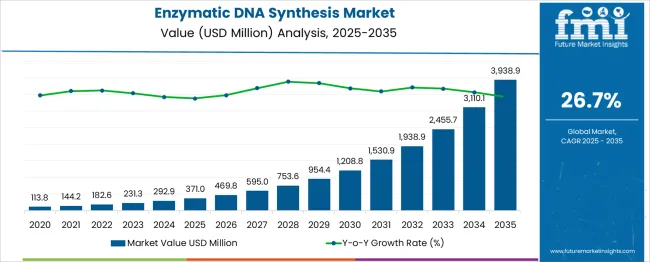
| Metric | Value |
|---|---|
| Estimated Value in (2025E) | USD 371 million |
| Forecast Value in (2035F) | USD 3938.9 million |
| Forecast CAGR (2025 to 2035) | 27% |
Market expansion is being supported by the rapid increase in synthetic biology research programs worldwide and the corresponding need for specialized DNA synthesis technologies to support advanced genetic engineering applications. Modern biotechnology development relies on precise DNA synthesis capabilities and optimized enzymatic processes to ensure proper sequence accuracy, synthesis efficiency, and product quality. Even minor variations in enzymatic synthesis conditions can significantly impact research outcomes and therapeutic development timelines.
The growing complexity of genetic engineering applications and increasing regulatory requirements are driving demand for standardized enzymatic DNA synthesis services from certified providers with appropriate quality systems and technical expertise. Regulatory agencies are increasingly requiring comprehensive documentation of DNA synthesis processes and supplier qualification to maintain research validity and ensure therapeutic safety. Manufacturing specifications and quality standards are establishing standardized synthesis protocols that require specialized enzymatic technologies and validated production capabilities.
The market is segmented by services outlook, application outlook, end-use outlook, and region. By services outlook, the market is divided into oligonucleotide synthesis, gene synthesis, vaccine development, and others. Based on application outlook, the market is categorized into synthetic biology, genetic engineering, and others. In terms of end-use outlook, the market is segmented into biopharmaceutical companies, academic and research institutes, and contract research organizations. Regionally, the market is divided into North America, Europe, East Asia, South Asia & Pacific, Latin America, and Middle East & Africa.
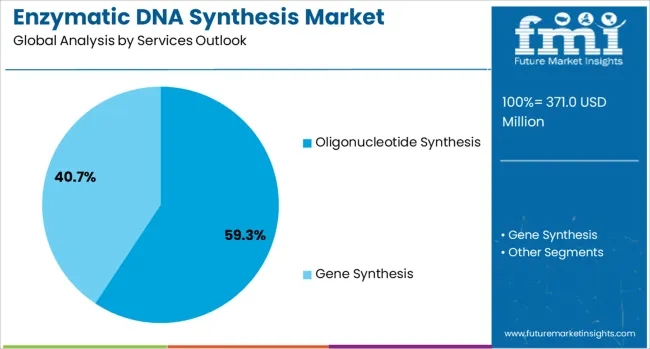
Oligonucleotide synthesis is projected to account for 59.3% of the Enzymatic DNA Synthesis market in 2025. This leading share is supported by the widespread adoption of oligonucleotide synthesis for therapeutic applications and research programs that require precise short DNA sequences. Enzymatic oligonucleotide synthesis provides superior sequence accuracy and reduced synthesis errors compared to traditional chemical methods, making it the preferred approach for most therapeutic and diagnostic applications. The segment benefits from established enzymatic processes and comprehensive quality control systems for clinical applications.
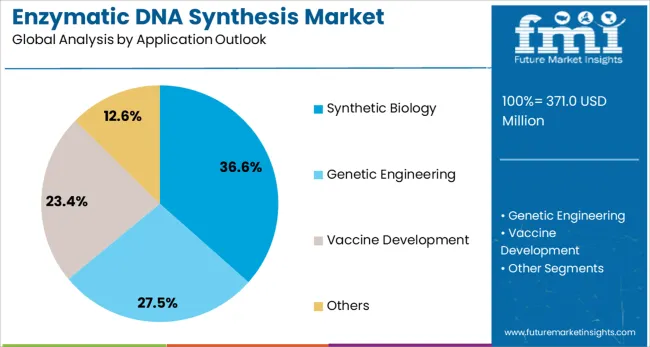
Synthetic biology is expected to represent 36.6% of enzymatic DNA synthesis demand in 2025. This substantial share reflects the extensive use of enzymatic DNA synthesis in synthetic biology research and the growing investment in engineered biological systems development. Modern synthetic biology applications require specialized DNA synthesis capabilities to create custom genetic circuits and optimized biological pathways for therapeutic and industrial applications. The segment benefits from increasing regulatory acceptance of synthetic biology approaches and growing demand for engineered therapeutic systems.
The market is advancing rapidly due to increasing synthetic biology adoption and growing recognition of enzymatic synthesis advantages over traditional chemical methods. However, the market faces challenges including high technology development costs, need for continuous validation of new enzymatic processes, and varying regulatory requirements across different therapeutic applications. Standardization efforts and quality assurance programs continue to influence technology development and market adoption patterns.
The growing development of automated enzymatic synthesis platforms is enabling higher throughput DNA production while reducing synthesis costs and improving sequence accuracy. Automated systems provide precise control over enzymatic reaction conditions and eliminate manual handling errors that may compromise synthesis quality. These platforms are particularly valuable for pharmaceutical companies and research institutions that require consistent high-volume DNA synthesis capabilities for therapeutic development programs.
Modern enzymatic synthesis providers are incorporating advanced quality control systems and comprehensive validation protocols that improve synthesis reliability and regulatory compliance. Integration of real-time monitoring systems and automated quality testing enables more precise process control and comprehensive batch documentation. Advanced validation also supports development of custom enzymatic synthesis protocols for specific therapeutic applications and regulatory requirements.
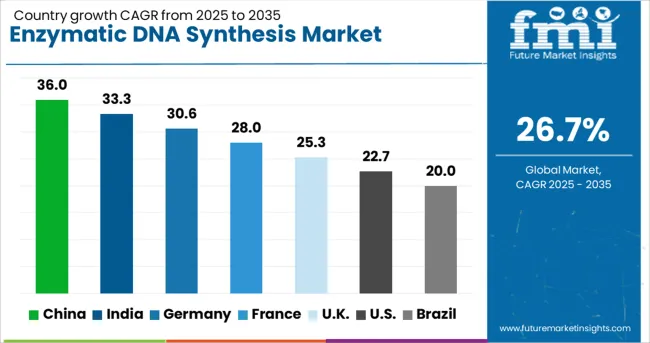
| Country | CAGR (2025 to 2035) |
|---|---|
| China | 36% |
| India | 33.3% |
| Germany | 30.6% |
| France | 28% |
| UK | 25.3% |
| USA | 22.7% |
| Brazil | 20% |
The enzymatic DNA synthesis market demonstrates exceptional growth patterns across key regions, with China leading at 36% CAGR through 2035, driven by expanding synthetic biology research and increasing genetic engineering development programs. India follows at 33.3%, supported by growing biotechnology sector investment and research infrastructure development. Germany records 30.6% growth, emphasizing advanced enzymatic synthesis technologies and precision research capabilities, while France shows 28% expansion through biotechnology research facility modernization programs. The UK demonstrates 25.3% growth through genetic engineering innovation initiatives, the USA shows 22.7% driven by synthetic biology development activities, and Brazil records 20% supported by biotechnology research modernization efforts.
Revenue from enzymatic DNA synthesis in China is projected to exhibit the highest growth rate with a CAGR of 36% through 2035, driven by rapid expansion of synthetic biology research programs and increasing investments in genetic engineering development infrastructure. The country's growing biotechnology industry and domestic therapeutic development programs are creating significant demand for advanced DNA synthesis technologies and specialized research support systems. Major research institutions and biotechnology companies are establishing comprehensive enzymatic synthesis capabilities to support both fundamental research and therapeutic development applications.
Government biotechnology development programs support establishment of world-class research facilities that meet international quality standards and regulatory requirements for global collaboration opportunities. Synthetic biology research initiatives facilitate adoption of advanced enzymatic synthesis technologies that support comprehensive genetic engineering capabilities across major biotechnology clusters.
Revenue from enzymatic DNA synthesis in India is expanding at a CAGR of 33.3%, supported by increasing synthetic biology research activities and growing biotechnology sector investment in advanced research capabilities. The country's expanding biotechnology industry and increasing focus on genetic engineering applications are driving demand for specialized enzymatic synthesis technologies and research support systems. Research institutions and biotechnology companies are gradually establishing comprehensive DNA synthesis capabilities to serve growing therapeutic development requirements.
Biotechnology industry growth and research infrastructure expansion create opportunities for specialized enzymatic synthesis providers that can support diverse research applications and regulatory compliance requirements. Professional training and technical development programs enhance research expertise among biotechnology companies, enabling comprehensive DNA synthesis utilization that meets international quality standards.
Demand for enzymatic DNA synthesis in Germany is projected to grow at a CAGR of 30.6%, supported by the country's emphasis on biotechnology innovation and precision research capabilities. German research institutions are implementing comprehensive enzymatic synthesis systems that meet stringent quality standards and regulatory specifications for synthetic biology applications. The market is characterized by focus on technological advancement, quality assurance programs, and compliance with comprehensive biotechnology research regulations.
Biotechnology research investments prioritize advanced enzymatic synthesis technologies that demonstrate superior performance consistency while meeting German research quality standards. Professional certification programs ensure comprehensive technical expertise among research personnel, enabling specialized DNA synthesis applications that support diverse genetic engineering research programs.
Revenue from enzymatic DNA synthesis in France is growing at a CAGR of 28%, driven by ongoing biotechnology research facility upgrades and increasing synthetic biology sector investments in genetic engineering capabilities. The country's established research infrastructure and growing focus on specialized therapeutic development are creating demand for advanced enzymatic synthesis systems and optimized research support capabilities. Research institutions and biotechnology companies are investing in modern DNA synthesis infrastructure to support innovative genetic engineering programs.
Biotechnology research industry modernization facilitates adoption of advanced enzymatic synthesis technologies that support comprehensive genetic engineering capabilities across major research and development centers. Technical development programs enhance DNA synthesis expertise among facility operators, enabling specialized synthesis utilization procedures that meet evolving biotechnology research requirements.
Demand for enzymatic DNA synthesis in the UK is expanding at a CAGR of 25.3%, driven by continued genetic engineering research excellence and synthetic biology development activities. The country's established biotechnology research infrastructure and growing investment in therapeutic applications are creating demand for specialized enzymatic synthesis systems and advanced research support capabilities. Universities and biotechnology companies are establishing comprehensive DNA synthesis capabilities to maintain competitive positioning in global genetic engineering research markets.
Genetic engineering research investments prioritize advanced enzymatic synthesis applications that support innovative therapeutic development while maintaining regulatory compliance and quality standards. Academic and industry collaboration programs facilitate knowledge transfer and technical expertise development that enhance DNA synthesis capabilities across research networks.
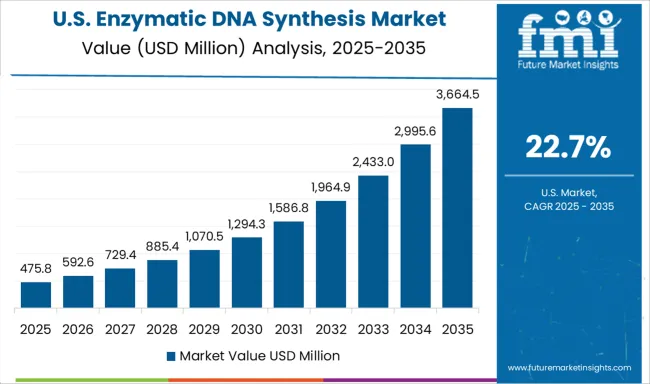
Demand for enzymatic DNA synthesis in the USA is expanding at a CAGR of 22.7%, driven by increasing synthetic biology development activities and growing emphasis on standardized research processes for genetic engineering applications. Large biotechnology companies and research organizations are establishing comprehensive enzymatic synthesis programs to serve diverse therapeutic development needs. The market benefits from regulatory agency requirements for DNA synthesis documentation and quality assurance following therapeutic development processes.
Biotechnology industry consolidation enables standardized enzymatic synthesis utilization across multiple research facilities, providing consistent research quality and comprehensive regulatory compliance throughout development networks. Professional training and certification programs develop specialized technical expertise among research personnel, enabling comprehensive DNA synthesis capabilities that support evolving genetic engineering requirements.
Revenue from enzymatic DNA synthesis in Brazil is growing at a CAGR of 20%, driven by increasing biotechnology research modernization and growing synthetic biology sector investment in genetic engineering capabilities. The country's expanding research infrastructure and increasing focus on domestic biotechnology development are creating opportunities for enzymatic synthesis providers and research support systems. Research institutions and biotechnology companies are gradually integrating advanced DNA synthesis technologies to support genetic engineering research programs.
Biotechnology research modernization facilitates adoption of advanced enzymatic synthesis technologies that support comprehensive genetic engineering research capabilities across major biotechnology regions. Professional service development programs enhance technical capabilities among research facilities, enabling specialized DNA synthesis applications that meet evolving biotechnology research requirements.
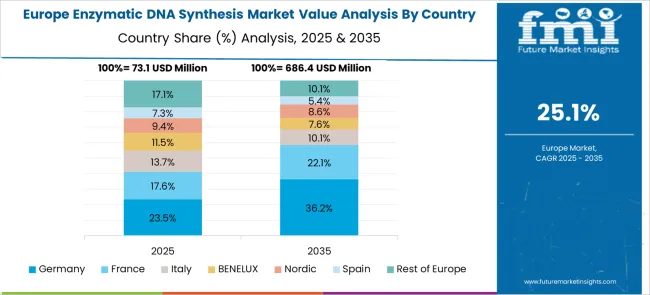
The market in Europe is projected to grow rapidly over the forecast period, with established biotechnology research centers driving strong demand for advanced DNA synthesis technologies. Germany is expected to maintain market leadership supported by its extensive synthetic biology research infrastructure and genetic engineering development programs. The European market demonstrates strong emphasis on advanced genetic engineering research and comprehensive regulatory compliance frameworks, particularly in synthetic biology applications and therapeutic development programs. Germany's leadership position reflects its robust biotechnology research sector and stringent quality standards for DNA synthesis applications, while France's substantial market presence indicates significant investment in biotechnology research modernization and genetic engineering capabilities.
European enzymatic DNA synthesis demand patterns show concentration in high-performance research applications, with oligonucleotide synthesis and gene synthesis representing dominant service segments across major markets. The region's strict biotechnology regulatory frameworks and quality standards drive preference for certified enzymatic synthesis providers, supporting premium technology adoption and specialized technical relationships. Germany's synthetic biology and genetic engineering research clusters, France's biotechnology facility modernization programs, and the United Kingdom's therapeutic development activities collectively establish Europe as a critical market for advanced enzymatic DNA synthesis technologies. Regional research collaboration networks and technical expertise development continue to strengthen European market position in global biotechnology research and genetic engineering applications.
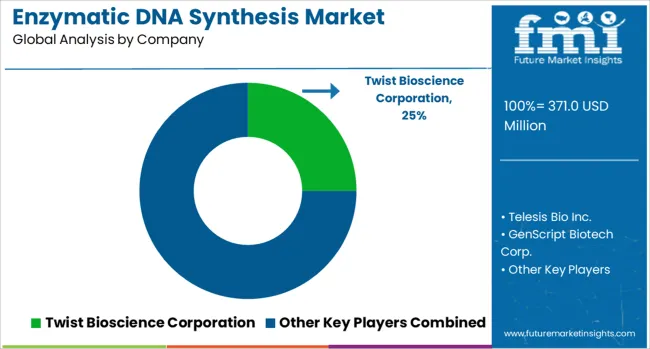
The enzymatic DNA synthesis market is defined by competition among specialized biotechnology companies, genetic engineering technology providers, and synthetic biology platform developers. Companies are investing in advanced enzymatic synthesis technologies, automated production systems, quality assurance protocols, and comprehensive technical support to deliver precise, reliable, and cost-effective DNA synthesis solutions. Strategic partnerships, technological innovation, and research collaboration are central to strengthening service portfolios and market presence in the rapidly evolving synthetic biology and genetic engineering landscape.
Major players in the market include Twist Bioscience Corporation, recognized for comprehensive synthetic biology platforms and scalable DNA synthesis capabilities. Telesis Bio Inc. offers specialized enzymatic synthesis technologies with focus on genetic engineering and therapeutic applications. GenScript Biotech Corp. provides diverse DNA synthesis services for research and manufacturing applications. Evonetix emphasizes advanced synthesis automation and precision control systems, while Ansa Biotechnologies Inc. focuses on innovative enzymatic synthesis methodologies and quality optimization. Additional market participants include Camena Bio, Molecular Assemblies, DNA Script, Touchlight, and Kern Systems, each contributing specialized expertise in enzymatic DNA synthesis technologies and supporting infrastructure for synthetic biology and genetic engineering research applications.
| Item | Value |
|---|---|
| Quantitative Units | USD 371 million |
| Services Outlook | Oligonucleotide Synthesis, Gene Synthesis, Vaccine Development, and Others |
| Application Outlook | Synthetic Biology, Genetic Engineering, and Others |
| End Use Outlook | Biopharmaceutical Companies, Academic & Research Institutes, and Contract Research Organizations |
| Regions Covered | North America, Europe, East Asia, South Asia & Pacific, Latin America, Middle East & Africa |
| Country Covered | United States, Canada, United Kingdom, Germany, France, China, Japan, South Korea, India, Brazil, Australia and 40+ countries |
| Key Companies Profiled | Twist Bioscience Corporation, Telesis Bio Inc., GenScript Biotech Corp., Evonetix, Ansa Biotechnologies Inc., Camena Bio, Molecular Assemblies, DNA Script, Touchlight, Kern Systems |
| Additional Attributes | Dollar sales by services outlook, application outlook, and end-use outlook, regional demand trends across North America, Europe, and Asia-Pacific, competitive landscape with established players and emerging biotechnology companies, buyer preferences for enzymatic versus chemical synthesis methods, integration with advanced synthetic biology platforms and automation systems, innovations in enzymatic synthesis protocols and quality control technologies, and adoption of standardized synthesis processes with comprehensive regulatory compliance and validation features. |
The global enzymatic DNA synthesis market is estimated to be valued at USD 371.0 million in 2025.
The market size for the enzymatic DNA synthesis market is projected to reach USD 3,938.9 million by 2035.
The enzymatic DNA synthesis market is expected to grow at a 26.7% CAGR between 2025 and 2035.
The key product types in enzymatic DNA synthesis market are oligonucleotide synthesis and gene synthesis.
In terms of application outlook, synthetic biology segment to command 36.6% share in the enzymatic DNA synthesis market in 2025.






Full Research Suite comprises of:
Market outlook & trends analysis
Interviews & case studies
Strategic recommendations
Vendor profiles & capabilities analysis
5-year forecasts
8 regions and 60+ country-level data splits
Market segment data splits
12 months of continuous data updates
DELIVERED AS:
PDF EXCEL ONLINE
Enzymatic RNA Manufacturing Market Analysis - Size, Share, and Forecast Outlook 2025 to 2035
Enzymatic Acrylamide-Reduction Systems Market Analysis - Size, Share, and Forecast Outlook 2025 to 2035
Enzymatic Cleaning Market – Demand, Innovations & Forecast 2025 to 2035
Enzymatically Interesterified Oils Market
Enzymatically Hydrolyzed Carboxymethyl Cellulose Market
Soybean Enzymatic Protein Market Size and Share Forecast Outlook 2025 to 2035
DNA Diagnostics Market Size and Share Forecast Outlook 2025 to 2035
DNA Microarray Market Forecast Outlook 2025 to 2035
DNA Methylation Conversion Kit Market Size and Share Forecast Outlook 2025 to 2035
DNA-Modified Plant Extracts Market Analysis - Size and Share Forecast Outlook 2025 to 2035
DNA-Repair Enzymes Market Analysis - Size, Share, and Forecast Outlook 2025 to 2035
DNA Chromatography Chips Market Size and Share Forecast Outlook 2025 to 2035
DNA Methylation Market Size and Share Forecast Outlook 2025 to 2035
DNA Polymerase Market Analysis - Size, Share, and Forecast 2025 to 2035
DNA Sequencing Services Market Trends - Growth & Forecast 2025 to 2035
DNA-Based Skin Care Market – Trends & Forecast 2025 to 2035
DNA/RNA Extraction Market Growth & Demand 2025 to 2035
DNA Sequencing Electrophoresis Systems Market
DNA modifying agents Market
DNA Synthesis Market Growth - Trends & Forecast 2025 to 2035

Thank you!
You will receive an email from our Business Development Manager. Please be sure to check your SPAM/JUNK folder too.
Chat With
MaRIA